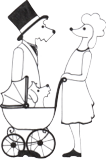Is Dog Daycare Right for Your Dog?

Benefits
You can think of most dogs today as “unemployed.” Dogs have been traditionally bred for jobs—typically in hunting, livestock herding, protection or guarding. Today their main job today is Couch Potato! Unfortunately, boredom and excess energy are two common reasons for behavior problems in pet dogs.
The main benefits that daycare can provide are:
- Relief from boredom
- Relief from loneliness and the anxiety that loneliness can cause in dogs (including separation anxiety)
- Much-needed exercise and socialization with other dogs and people
- Prevention of destructive behavior in the house when unsupervised
- Relief from guilt for pet parents who feel badly about leaving their dogs home alone all day
Is TopDog Daycare Right for Your Dog?
Good candidates for daycare are healthy, spayed or neutered and well-socialized dogs who truly enjoy interaction with other dogs. Young dogs often adjust to the daycare environment better than older ones. If your dog is a regular at dog parks, and enjoys herself there, then TopDog is probably ideal for her.
However, some dogs do better sleeping at home alone than spending the day in the company of other dogs. If your dog has ever bitten another dog; is regularly aggressive toward other dogs (snarling, growling or snapping); is fearful, tense or anxious; or tends to avoid or just tolerate other dogs, then daycare is probably not right for her. Hiring a dog walker, asking friends or neighbors to visit your dog in the middle of the day, or coming home at lunch may be better options for you.
Other unsuitable candidates for daycare include:
- Unvaccinated puppies
- Dogs not spayed or neutered
- Under-socialized dogs who haven’t had sufficient pleasant experiences with a wide variety of other dogs
- Bullies who tend to pick on other dogs
- Dogs who lack good social skills and whose intensity and energy often seem to annoy or scare other dogs
- “Fun police” dogs (often herding breeds) who run around trying to control the movements of other dogs and interfere with their playing
- Puppies less than twelve weeks of age
Fleas & Ticks
All dogs need to be free of fleas and ticks and on a monthly flea preventative. If fleas or ticks are observed on your dog, you will be contacted and can have your pet treated in the grooming department (if scheduling permits,) or you will need to come and pick up your dog.

TopDog Daycare at Medway Mills.
161 Main St Medway Ma